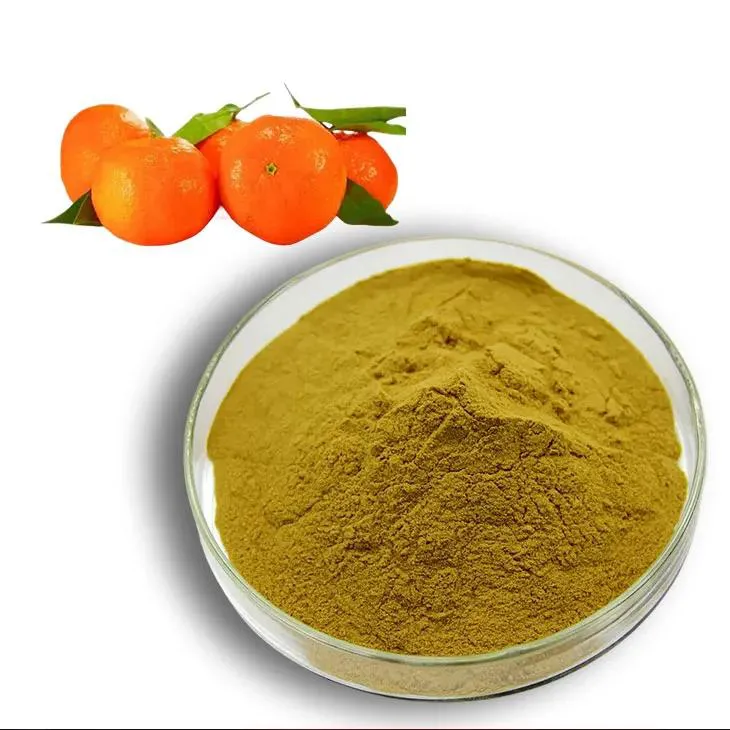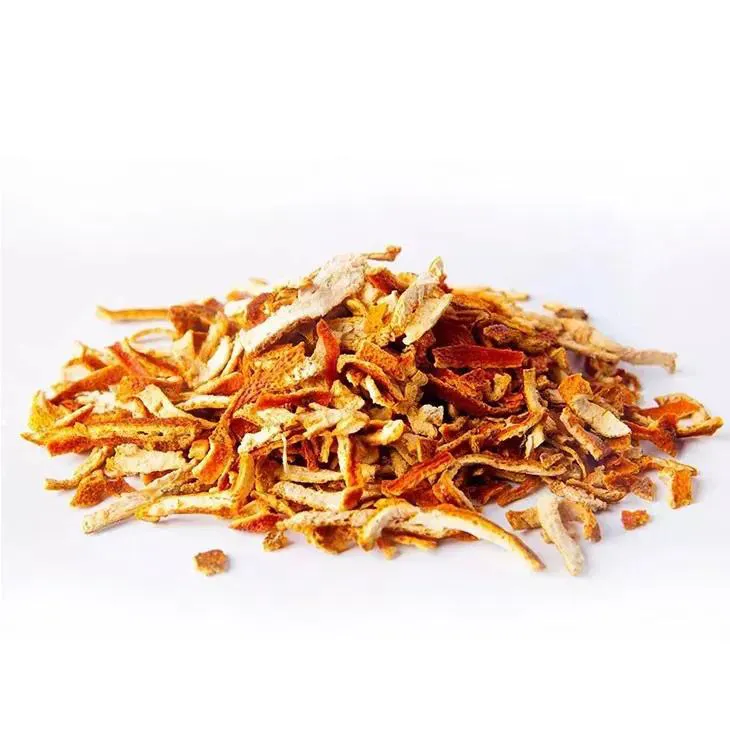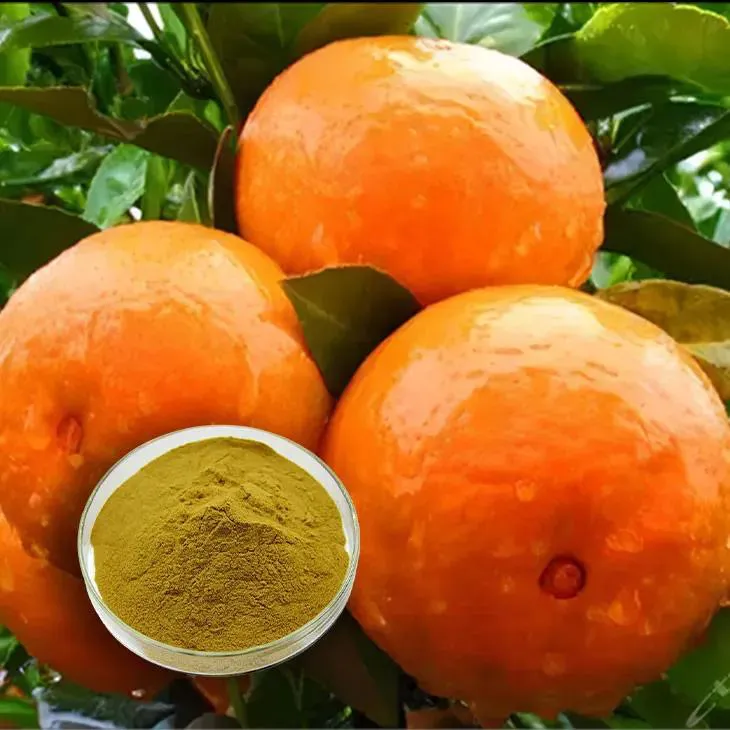- 0086-571-85302990
- sales@greenskybio.com
14 Major Health - care Efficacy of Citrus Bioflavonoids
2024-11-12

1. Introduction to Citrus bioflavonoids
Citrus bioflavonoids are a group of natural compounds found in citrus fruits such as oranges, lemons, and grapefruits. These compounds are known for their diverse health - promoting properties. They are often found in the peel, pulp, and membranes of citrus fruits and are consumed either through eating the whole fruit or by taking citrus bioflavonoid supplements.

2. Anti - Cancer Properties
Cancer Prevention and Cell Growth Inhibition: Citrus bioflavonoids have been shown to possess anti - cancer properties. Flavonoids like Hesperidin and naringenin are of particular interest in cancer research. In some cases, they can inhibit the growth of cancer cells. For example, in vitro studies have demonstrated that certain citrus bioflavonoids can interfere with the cell cycle of cancer cells, preventing them from dividing and multiplying uncontrollably.
Mechanisms of Action: The anti - cancer effects of citrus bioflavonoids may be due to multiple mechanisms. One possible mechanism is their antioxidant activity. Cancer development is often associated with oxidative stress, and by scavenging free radicals, citrus bioflavonoids can reduce the damage to cells' DNA, which is a crucial step in cancer initiation. Additionally, they may also modulate cell signaling pathways involved in cancer cell survival, apoptosis (programmed cell death), and angiogenesis (the formation of new blood vessels to supply tumors).

3. Benefits for Skin Health
Collagen Production: For skin health, citrus bioflavonoids can play a significant role in promoting collagen production. Collagen is a key protein that provides structural support to the skin, keeping it firm and elastic. As we age, collagen production naturally declines, leading to the formation of wrinkles and sagging skin. Citrus bioflavonoids, such as Quercetin, can stimulate fibroblasts, the cells responsible for producing collagen in the skin. By enhancing collagen synthesis, they can contribute to more youthful - looking skin.
Antioxidant Protection for the Skin: The skin is constantly exposed to environmental stressors such as ultraviolet (UV) radiation, pollution, and free radicals. Citrus bioflavonoids' antioxidant properties can help protect the skin from these harmful factors. They can neutralize free radicals generated by UV exposure, reducing oxidative damage to skin cells. This antioxidant protection can also help prevent premature aging of the skin, including the formation of age spots and fine lines.

4. Maintaining Healthy Blood Vessels
Enhancing Vascular Function: Citrus bioflavonoids assist in maintaining healthy blood vessels. They can improve the function of the endothelial cells that line the inside of blood vessels. Endothelial cells play a crucial role in regulating blood flow, blood pressure, and preventing blood clot formation. For instance, citrus bioflavonoids can increase the production of nitric oxide in endothelial cells. Nitric oxide is a vasodilator, which means it relaxes the smooth muscle in blood vessel walls, allowing for wider blood vessels and better blood circulation.
Reducing Inflammation in Blood Vessels: Inflammation in blood vessels can lead to various cardiovascular problems. Citrus bioflavonoids have anti - inflammatory properties that can help reduce inflammation in the vascular system. By suppressing inflammatory mediators, they can protect blood vessels from damage and maintain their integrity. This is important for preventing conditions such as atherosclerosis, where the build - up of plaque in the arteries can restrict blood flow.
5. Immune System Boosting
Enhancing Immune Cell Function: Citrus bioflavonoids can boost the immune system. They can enhance the function of immune cells such as lymphocytes, macrophages, and neutrophils. These immune cells are responsible for recognizing and eliminating foreign invaders such as bacteria, viruses, and fungi. For example, some citrus bioflavonoids can increase the phagocytic activity of macrophages, which means they can more effectively engulf and destroy pathogens.
Antiviral and Antibacterial Effects: In addition to enhancing immune cell function, citrus bioflavonoids also have direct antiviral and antibacterial effects. They can interfere with the replication of viruses and the growth of bacteria. For instance, certain bioflavonoids have been shown to inhibit the influenza virus and some common bacteria like Staphylococcus aureus.
6. Anti - Inflammatory Effects
System - wide Anti - Inflammatory Action: Citrus bioflavonoids exhibit anti - inflammatory effects throughout the body. Inflammation is a natural response of the body to injury or infection, but chronic inflammation can lead to various diseases such as arthritis, diabetes, and heart disease. Citrus bioflavonoids can modulate the body's inflammatory response by suppressing the production of pro - inflammatory cytokines such as interleukin - 1β and tumor necrosis factor - α.
Targeted Anti - Inflammatory in Specific Tissues: They can also have targeted anti - inflammatory effects in specific tissues. For example, in the joints, citrus bioflavonoids may help reduce inflammation associated with arthritis. In the gut, they can help soothe inflammation in cases of inflammatory bowel diseases.
7. Cardiovascular Health Promotion
Lowering Cholesterol Levels: Citrus bioflavonoids can contribute to cardiovascular health by lowering cholesterol levels. They can interfere with the absorption of dietary cholesterol in the intestine and also promote the excretion of cholesterol from the body. Some studies have shown that citrus bioflavonoids can reduce low - density lipoprotein (LDL) cholesterol, which is often referred to as "bad" cholesterol, while maintaining or even increasing high - density lipoprotein (HDL) cholesterol, the "good" cholesterol.
Reducing Blood Pressure: Another important aspect of cardiovascular health is blood pressure regulation. Citrus bioflavonoids can help reduce blood pressure through multiple mechanisms. As mentioned earlier, their ability to enhance nitric oxide production can lead to vasodilation, which in turn can lower blood pressure. Additionally, they may also affect the renin - angiotensin - aldosterone system, a hormonal system that plays a key role in blood pressure regulation.
8. Eye Health Benefits
Protecting Against Macular Degeneration: Citrus bioflavonoids can be beneficial for eye health, especially in protecting against age - related macular degeneration (AMD). AMD is a leading cause of vision loss in older adults. The antioxidant properties of citrus bioflavonoids can help protect the retina from oxidative damage caused by factors such as UV light and free radicals. By reducing this oxidative stress, they can slow down the progression of AMD.
Reducing Cataract Formation: Cataracts are another common eye problem, characterized by the clouding of the eye's lens. Citrus bioflavonoids may help reduce the risk of cataract formation. Their antioxidant and anti - inflammatory properties can protect the lens from damage and maintain its transparency.
9. Digestive Health Support
Improving Gut Motility: Citrus bioflavonoids can support digestive health by improving gut motility. They can stimulate the smooth muscles in the digestive tract, promoting the movement of food through the intestines. This can help prevent constipation and ensure regular bowel movements.
Protecting the Gut Lining: The gut lining plays a crucial role in preventing the entry of harmful substances into the bloodstream. Citrus bioflavonoids can help protect the gut lining by reducing inflammation and enhancing the integrity of the epithelial cells that line the gut. This can be beneficial for people with conditions such as leaky gut syndrome.
10. Anti - Allergic Properties
Modulating the Immune Response in Allergies: Citrus bioflavonoids have anti - allergic properties. They can modulate the immune response in allergic reactions. In an allergic reaction, the immune system overreacts to harmless substances such as pollen or certain foods. Citrus bioflavonoids can help regulate the immune system's response, reducing the production of allergy - related antibodies such as IgE.
Reducing Inflammatory Mediators in Allergic Reactions: They can also reduce the production of inflammatory mediators in allergic reactions. For example, they can decrease the release of histamine, which is responsible for many of the symptoms of allergies such as itching, sneezing, and swelling.
11. Role in Diabetes Management
Regulating Blood Sugar Levels: In diabetes management, citrus bioflavonoids can play a role in regulating blood sugar levels. They can improve insulin sensitivity, which means that the body's cells can more effectively respond to insulin. This can help in better blood sugar control, both in type 1 and type 2 diabetes.
Protecting Against Diabetic Complications: Additionally, citrus bioflavonoids can protect against diabetic complications. Diabetes can lead to various complications such as nerve damage, kidney disease, and cardiovascular problems. The antioxidant and anti - inflammatory properties of citrus bioflavonoids can help reduce oxidative stress and inflammation associated with diabetes, thereby protecting against these complications.
12. Brain Health and Cognitive Function
Protecting Neurons: Citrus bioflavonoids can be beneficial for brain health. They can protect neurons from damage caused by oxidative stress and inflammation. Neurons are the basic building blocks of the brain, and their damage can lead to cognitive decline and neurodegenerative diseases such as Alzheimer's and Parkinson's.
Enhancing Cognitive Function: Some studies suggest that citrus bioflavonoids may also enhance cognitive function. They can improve memory, attention, and learning ability. The mechanisms behind these effects may be related to their ability to improve blood flow to the brain and modulate neurotransmitter systems.
13. Anti - Aging Effects
Cellular Level Anti - Aging: At the cellular level, citrus bioflavonoids have anti - aging effects. They can protect cells from oxidative damage, which is one of the main causes of cellular aging. By scavenging free radicals, they can slow down the aging process of cells, including the shortening of telomeres, which are the protective caps at the ends of chromosomes.
System - wide Anti - Aging: System - wide, citrus bioflavonoids can contribute to anti - aging. Their effects on various body systems such as the skin, cardiovascular system, and immune system can help maintain overall health and vitality as we age. For example, by promoting collagen production in the skin and maintaining healthy blood vessels, they can help us look and feel younger.
14. Conclusion
Citrus bioflavonoids offer a wide range of health - care benefits. From anti - cancer properties to promoting skin health, maintaining healthy blood vessels, boosting the immune system, and more, these natural compounds found in citrus fruits are a valuable addition to a healthy diet or as supplements. However, more research is still needed to fully understand their mechanisms of action and to optimize their use in various health conditions.
FAQ:
Q1: How do citrus bioflavonoids inhibit the growth of cancer cells?
There are several mechanisms through which citrus bioflavonoids may inhibit cancer cell growth. Some bioflavonoids can interfere with the cell cycle of cancer cells, preventing their normal division. Others may induce apoptosis, which is programmed cell death in cancer cells. However, the exact pathways are still being studied in more detail.
Q2: Can citrus bioflavonoids completely prevent skin aging?
While citrus bioflavonoids can promote collagen production which is beneficial for skin health and can reduce the appearance of aging, they cannot completely prevent skin aging. Skin aging is a complex process influenced by multiple factors such as genetics, sun exposure, diet, and lifestyle. But incorporating citrus bioflavonoids into a healthy lifestyle can be a helpful part of a skin - care routine.
Q3: How do citrus bioflavonoids maintain healthy blood vessels?
Citrus bioflavonoids can maintain healthy blood vessels in several ways. They may help reduce inflammation in the blood vessels, which can prevent damage. Some bioflavonoids also have antioxidant properties that protect the cells lining the blood vessels from oxidative stress. Additionally, they can play a role in regulating blood pressure, which is important for the overall health of blood vessels.
Q4: Are there any side effects of consuming citrus bioflavonoids?
In general, when consumed in normal amounts through dietary sources, citrus bioflavonoids are safe for most people. However, in some cases, high - dose supplements may cause some mild side effects such as stomach upset or allergic reactions in individuals who are sensitive to citrus fruits. It's always advisable to consult a healthcare provider before starting any high - dose supplement.
Q5: How much citrus bioflavonoids should one consume daily for optimal health?
There is no established specific amount of citrus bioflavonoids that one should consume daily for optimal health. However, a diet rich in citrus fruits can provide a good amount of bioflavonoids. If considering supplements, it is best to follow the recommended dosage on the product label or consult a healthcare professional as individual needs may vary depending on factors such as age, health status, and overall diet.
Related literature
- The Role of Citrus Bioflavonoids in Cancer Prevention"
- "Citrus Bioflavonoids and Skin Health: A Comprehensive Review"
- "Impact of Citrus Bioflavonoids on Vascular Health"
- ▶ Hesperidin
- ▶ Citrus Bioflavonoids
- ▶ Plant Extract
- ▶ lycopene
- ▶ Diosmin
- ▶ Grape seed extract
- ▶ Sea buckthorn Juice Powder
- ▶ Fruit Juice Powder
- ▶ Hops Extract
- ▶ Artichoke Extract
- ▶ Mushroom extract
- ▶ Astaxanthin
- ▶ Green Tea Extract
- ▶ Curcumin
- ▶ Horse Chestnut Extract
- ▶ Other Product
- ▶ Boswellia Serrata Extract
- ▶ Resveratrol
- ▶ Marigold Extract
- ▶ Grape Leaf Extract
- ▶ New Product
- ▶ Aminolevulinic acid
- ▶ Cranberry Extract
- ▶ Red Yeast Rice
- ▶ Red Wine Extract
-
Medicinal Marshmallow Extract
2024-11-12
-
Garcinia Cambogia Extract
2024-11-12
-
Hawthorn powder
2024-11-12
-
Hericium erinaceus extract powder
2024-11-12
-
Red Vine Extract
2024-11-12
-
Cactus Extract
2024-11-12
-
Chaste Berry Extract
2024-11-12
-
Apricot Powder
2024-11-12
-
Troxerutin
2024-11-12
-
Citrus Aurantium Extract
2024-11-12





















